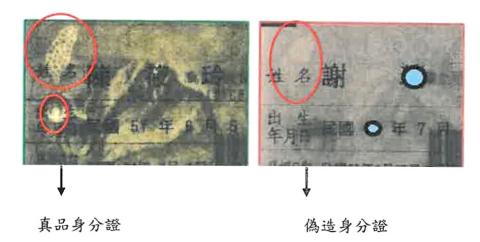Fake Republic of China (ROC) identification cards made in China pose the same level of threat to national security as African swine fever, Democratic Progressive Party Legislator Lai Jui-lung (賴瑞隆) said yesterday.
The national ID card has the best anti-counterfeit technology among all identification documents in the nation, a Ministry of the Interior official said yesterday on condition of anonymity, but added that the ministry has noticed recent cases of fake national IDs “that looked almost authentic.”
China’s ability to supply anti-counterfeit paper, color-changing ink and other materials — some of which can be purchased via the Internet — to produce ROC identification cards could have an impact on Taiwan’s security, the source said.

Photo courtesy of the Ministry of the Interior
People could use fake national ID cards to apply for passports, impersonate others or take out loans, or Chinese intelligence officers or spies could use them to engage in clandestine work, the source said.
For example, each year, the military opens its camps to the public for visits as a way to promote civil defense and display its advanced weapons, the source said.
Taiwanese can tour the grounds by showing their national ID cards, but Chinese tourists are prevented from entering, the source added.
If counterfeit technology is capable of producing fake IDs that look authentic, then Chinese with ulterior motives could enter military camps using fake IDs and survey Taiwan’s military facilities and equipment, the source said.
Lai said that if fake ROC IDs are produced in China or used by Chinese intelligence officers to enter Taiwan, this would be as “scary” as the outbreak of African swine fever in China.
The potential impact would be enormous, he said, urging the government to introduce national ID cards with integrated chips soon to curtail the threat.
As China steps up its “united front” tactics against Taiwan, the number of unidentified individuals who are lurking in Taiwan is increasing, he said.
The national security and police agencies should investigate how to prevent or ban the sale of “toxic pork” and materials used in the production of fake IDs via the Internet, he said.
The Executive Yuan last month announced that it would replace national ID cards with electronic ID cards in the second half of next year.
The new ID cards would be harder to counterfeit than the current cards, which are made of paper, the ministry said.

DAREDEVIL: Honnold said it had always been a dream of his to climb Taipei 101, while a Netflix producer said the skyscraper was ‘a real icon of this country’ US climber Alex Honnold yesterday took on Taiwan’s tallest building, becoming the first person to scale Taipei 101 without a rope, harness or safety net. Hundreds of spectators gathered at the base of the 101-story skyscraper to watch Honnold, 40, embark on his daredevil feat, which was also broadcast live on Netflix. Dressed in a red T-shirt and yellow custom-made climbing shoes, Honnold swiftly moved up the southeast face of the glass and steel building. At one point, he stepped onto a platform midway up to wave down at fans and onlookers who were taking photos. People watching from inside

A Vietnamese migrant worker yesterday won NT$12 million (US$379,627) on a Lunar New Year scratch card in Kaohsiung as part of Taiwan Lottery Co’s (台灣彩券) “NT$12 Million Grand Fortune” (1200萬大吉利) game. The man was the first top-prize winner of the new game launched on Jan. 6 to mark the Lunar New Year. Three Vietnamese migrant workers visited a Taiwan Lottery shop on Xinyue Street in Kaohsiung’s Gangshan District (崗山), a store representative said. The player bought multiple tickets and, after winning nothing, held the final lottery ticket in one hand and rubbed the store’s statue of the Maitreya Buddha’s belly with the other,

‘NATO-PLUS’: ‘Our strategic partners in the Indo-Pacific are facing increasing aggression by the Chinese Communist Party,’ US Representative Rob Wittman said The US House of Representatives on Monday released its version of the Consolidated Appropriations Act, which includes US$1.15 billion to support security cooperation with Taiwan. The omnibus act, covering US$1.2 trillion of spending, allocates US$1 billion for the Taiwan Security Cooperation Initiative, as well as US$150 million for the replacement of defense articles and reimbursement of defense services provided to Taiwan. The fund allocations were based on the US National Defense Authorization Act for fiscal 2026 that was passed by the US Congress last month and authorized up to US$1 billion to the US Defense Security Cooperation Agency in support of the

HIGH-TECH DEAL: Chipmakers that expand in the US would be able to import up to 2.5 times their new capacity with no extra tariffs during an approved construction period Taiwan aims to build a “democratic” high-tech supply chain with the US and form a strategic artificial intelligence (AI) partnership under the new tariffs deal it sealed with Washington last week, Taipei’s top negotiator in the talks said yesterday. US President Donald Trump has pushed Taiwan, a major producer of semiconductors which runs a large trade surplus with the US, to invest more in the US, specifically in chips that power AI. Under the terms of the long-negotiated deal, chipmakers such as Taiwan Semiconductor Manufacturing Co (TSMC, 台積電) that expand US production would incur a lower tariff on semiconductors or related manufacturing